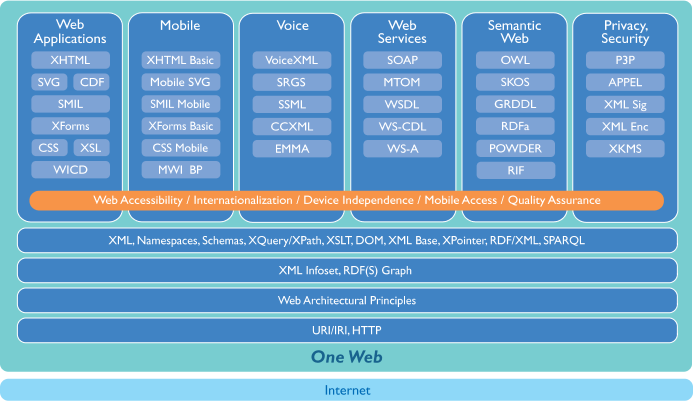World Wide Web Consortium (W3C)
- Leading the Web to its Full Potential
- ... or in plain words from a colleague:
W3C
- Founded by Web inventor Tim Berners-Lee (1994)
- W3C Provides the Vision and the Standards to Lead the Web:
- from a Web of Documents... toward One Web:
- of Data and Services
- on Everything
- for Everyone
Where’s eGov?

Keeping it simple
- eGovernment
- “the use of ICTs, and particularly the Internet, as a tool to
achieve better government”
- example: citizen-centric Government
Where’s eGov? (revisited)

Where’s eGov? (revisited)

Where’s eGov? (revisited)

Where’s eGov? (revisited)

It's behind the scenes!

A Big Picture

Why W3C cares about eGovernment?
- The Web has become the main channel for Governments to deliver services
to citizens
- Web technologies are crucial in the relationships between Govs, and
Govs and Industry
- Use of W3C Technologies in eGov is increasing
- W3C standards named in laws (e.g. Web Accessibility)
Role of Governments
- The purpose of the Web is to help foster open communication and
information sharing and we believe Governments should participate in open
communication and information sharing
- We think Governments have some unique requirements (e.g. to demand and
enforce certain policies about information privacy) and we want those
requirements to be reflected in the standards we produce
eGovernment efforts at W3C
- Series of discussions to better understand the needs of Government in
deploying current Web standards and the directions that future Web
standards should take to best address delivery of Government services.
Improving eGov using Open Web Standards
- Openness
- Interoperability
- Privacy, Security and Trust
- Bridging the Digital Divide
Openness
What Open Standard means?
- Transparent process
- Open participation
- Technical Consensus
- Running code
- Free and Persistent Specification
- W3C Patent Policy for Web
Technologies
Why Open Web Standards?
- Open Standards increase innovation and competition
- Increase citizens and market trust
- not tied to proprietary solutions
- avoid vendor lock-in
Best Practices and Methodologies
- The development of standards-based interoperable frameworks improve
efficiencies and increase the value of IT investments
- Accessibility as an example:
- adherence to standards makes it easier for the content providers to
serve browser-independent content
- Government leadership is important in getting the technology
vendors and the content providers to do the right thing for all
citizens
Interoperability, Data Integration
Basic Interoperability
- What about Web pages that can only be accessed using a given
browser?
- New technologies, old problems, e.g.:
- accessibility (think multi-channel delivery)
- mobile phones as enablers of Government services (e.g. in
developing countries)
- difficult to build an interoperable solution (too many devices,
browsers...), see the Mobile Web
Initiative (MWI) work
Semantic Interoperability
- Lots of initiatives and interoperability frameworks built or in the
works
- usually work only in a given context (national, regional...), hard
to interoperate between them yet
- Producing XML does not mean to be interopeable
- Interoperability is not (only) a technical issue
A real example

Data Integration
- Use Semantic Web technologies
- allows mixing data from very different sources
- no need to thrown away your existing data or systems, just build on
top
- share, publish, use standards (RDF, OWL, SPARQL...), plan for
unexpected reuse
- use IDs (URIs)
Privacy, Transparency, Trust
Creating a Trust Context
- Opacity vs. Transparency
- use the data for the purpose it was collected
Bridging the Digital Divide
Mobile Web in Developing Countries
 |
- Same issues already mentioned plus new ones (eg.
infrastructure)
- W3C Goal: to make the Web accessible, relevant, usable and
useful for under-privileged populations and rural communities
- The Mobile Web is the most promising platform for low-cost
large scale development, deployment and adoption of ICTs
More about ongoing work at: http://www.w3.org/2006/12/digital_divide/public.html
|
| (Photo Source: Der
Spiegel) |
Conclusions
- eGovernment Services increasing sophistication, but “good old
problems” not solved yet
- The use of Open Standards can help
- Need cooperation and skip reinventing the wheel, e.g., use cases and
best practices
- Governments should be involved in development of Open Standards
- eGovernment should be accessible to all
Food for thought (not mine)
"The big vendors had their chance and blew it. Now it's time for the demand
side of the equation to pickup the pieces and go for the universal
interoperability demanded by a real world convergence of information
systems needing to perfect the high fidelity exchange..."
Gary
Edwards and Buck Martin, LinuxWorld











